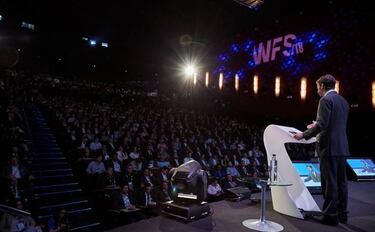"We're competing against Taylor Swift and Fortnite"
Charlie Marshall, the managing director of the European Club Association, spoke at the World Football Summit in Madrid about the changes coming to European competition.

Charlie Marshall, the managing director of the European Club Association, was interviewed by Kieran Maguire, a football finance lecturer at the University of Liverpool at the opening morning of the World Football Summit in Madrid, to discuss the future of European football.
Football's wider voice
Marshall explained that the ECA grew out of the G14, which represented only Europe’s very biggest clubs, while the new organisation, with 246 member clubs, has a broader view of representation, with the aim of giving a voice to clubs from all 55 national football associations. The ECA is now just over 10 years old.
Discussing the challenges and opportunities for European football, Marshall said that the context was wider than just sport, but that the ECA has to look at the wider social and geopolitical landscape. Stressing that football is the biggest global sport, being twice the size of the next biggest, the NFL, with European football the biggest market, Marshall said that while the growth story – double digit growth of the past 15 years – it was vital for the clubs and institutions to keep innovating in order to keep European football fresh, and to keep market share in what can be a difficult market.
Expansion = opportunity
The expansion of European football to a third tier is one of the major innovations coming to European football, with the introduction of a new third competition underneath the Europa League coming in two years time. Marshall explained that this was in response to strong calls from the ECA members to allow for more opportunity to take part in European competition.
💬 “Playing regularly in European competitions gives clubs more stability and continuity in their development, and for many clubs this journey ends in July & August, which isn't thought about much in the top markets”
— World Football Summit (@WFSummit) September 24, 2019
Charlie Marshall - @ECAEurope #WFS19 pic.twitter.com/KtaMjLnYZk
“This season there are 80 teams taking part in CL and EL, the third competition is about expanding base of the competition, and would be about refining the shape to make it more linear. The EL would be moved from 48 to 32. To get a 32, 32, 32 structure. Participation is at the heart of it. More opportunities for the clubs. It’s a mixture of brand new clubs who want to come in and forge their European stories for the first time. It’s also for clubs who are aren’t in the bigger leagues, but want to be in Europe”, explained Marshall.
According to the ECA executive, too many clubs’ European stories end in July and August and what the ECA want to achieve is to rewarding performance on a more sustained basis across the season. Having more group stage games is good for the clubs because it helps planning them plan their financial and commercial approach and has positive effects on deciding on squads and stadiums.
Future challenges ready to be faced
Related stories
What most worries the ECA about the future, although is also seen as an opportunity, are the fast paced change in social and consumer trends, in particular with changes in how content is consumed. “One of the challenges we have as an industry is an ageing population and the younger demographics changing their tastes. There seem to be fundamental changes in the way younger people engage with content. How people spend their time is changing. Our competitors aren’t other football leagues, but Taylor Swift and Fortnite”, said Marshall.

“In five years time we’ll just be at the beginning of the cycle of 2024-2027, and everything being discussed at the moment will be just starting. We’ll have had five more Champions League winners, five more Europa League winners and three third-tier winners. The biggest change will be the way in which the product is distributed and consumed. There will be new distribution technologies and new ways of communicating with fans. There will be so much innovation over the next five years. I don’t think there will be so many people sitting on their seats, watching on big screens, though that will still exist, but the fragmentation of the consumption model will be rife”, concluded Marshall.
